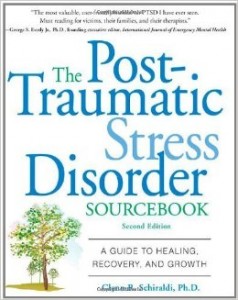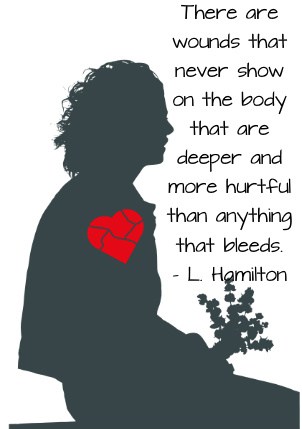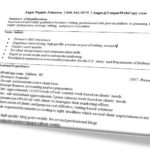Here’s a simple explanation of what post traumatic stress disorder (PTSD) is, and the most common symptoms and treatments. Post-traumatic stress symptoms can be caused by natural disasters, terrorist attacks, and even assault at work or child abuse at home. Any event that is frightening or traumatic can result in long-lasting and debilitating symptoms that affect not just the survivor, but friends and family as well.

What is Post Traumatic Stress Disorder?
The Post-Traumatic Stress Disorder Sourcebook: A Guide to Healing, Recovery, and Growth by Glenn Schiraldi will help you live your life more fully-without fear, pain, depression, or self-doubt. You’ll learn how to identify emotional triggers-and protect yourself from further harm, understand the link between PTSD and addiction-and how to break it, and find the best treatments and techniques that are right for you.
PTSD symptoms can occur immediately after the traumatic experience, or many months later.
For an “official” diagnosis of PTSD, symptoms must last more than a month. The symptoms usually arise within three months of the traumatic event. How long the symptoms last and how severe they are depends on personality, level of anxiety, and amount of social support or counseling.
What is Post-Traumatic Stress Disorder?
PTSD is a psychological disorder rooted in anxiety or panic, and can be caused by floods, earthquakes, accidents, abuse, and other frightening events. Traumatic experiences overwhelm normal biological and psychological mechanisms, and can result in behaviors that are uncontrollable and confusing for everyone involved.
The feelings of helplessness, terror, and loss of control (PTSD symptoms) are overwhelming. The first step towards treating post-traumatic stress is learning how to recognize the symptoms. Post-traumatic stress survivors can find it difficult to resume their normal life and activities. PTSD survivors can’t just go back to the way things were – for them, everything has changed.
PTSD Symptoms
Feeling numb and hopeless is common in people with PTSD. So are signs of depression, loss of interest in the world, and losing interest in previously enjoyable activities, like sexual intimacy or old friendships. Extreme passivity and numbness can be symptoms of post-traumatic stress disorder, perhaps signaling learned helplessness. Survivors of PTSD don’t act or feel as affectionate or light-hearted as they once were.
Many people deny the traumatic experience, or they “intellectualize” it. PTSD survivors either ignore it entirely or talk about it but dissociate their feelings from it. Others relive it in flashbacks when they’re awake or nightmares when they’re asleep. These relived events are filled with the same fear and lack of control as the original traumatic experience. Survivors of post-traumatic stress could act and feel like the trauma is actually occurring; their terror and anxiety is emotionally overwhelming.
Survivors of post-traumatic stress always expect danger. They can be irritable, anxious, moody, aggressive, agitated, and easily startled. People with PTSD could develop phobias to things that were present during the event. Insomnia and disrupted sleep are common. Signs of post-traumatic stress include outbursts of anger or rage.
Feelings of helplessness and loss of control are symptoms of post-traumatic stress disorder (PTSD) – and soldiers aren’t the only people who struggle with post-traumatic stress. PTSD symptoms can also be found in people who experienced assaults, abuse, or even natural disasters.
If your partner is dealing with symptoms of post traumatic stress, read How to Help Your Husband Cope With PTSD.
Causes of PTSD
Any traumatic experience can trigger PTSD symptoms. Assault, child abuse, and other acts of violence can cause this anxiety disorder. For example, seeing a parent harmed can severely affect your emotions and growth, and lead to feelings of rage and vulnerability. Surviving post-traumatic stress and getting healthy involves recognizing the signs and complications.
Survivors of PTSD symptoms are more likely to experience substance abuse, depression, phobias, learning disorders, chronic pain syndrome, poor concentration, sleep disturbances, and other psychological challenges. It’s difficult to work, sleep, enjoy life, and build intimate relationships when you’re dealing with severe anxiety attacks. Feelings of intense fear, helplessness, or horror are the most common PTSD symptoms.
People who are more likely to suffer from PTSD:
- Have pre-existing psychologically or physiologically vulnerabilities
- Suffered a physical injury during the traumatic event, most often to the head
- Lack social support, such as friends or family
Children and the elderly are the most common victims of PTSD – especially children. Females may be more likely to experience it; sexual assault is the most common reason for women, and combat is the most common reason for men. Personality traits may also be a factor in treating post-traumatic stress disorder successfully. The more severe the trauma, the more likely post-traumatic stress disorder is.
Treatments for Post-Traumatic Stress Disorder
Once called “shell shock” in war veterans, post-traumatic stress now includes a variety of experiences. Treatments for PTSD includes therapy, support groups, & medication.
Psychotherapy for PTSD symptoms. For most sufferers, cognitive-behavioral therapy may successfully treat post-traumatic stress: cognitive therapy, stress inoculation training, visualization techniques, etc. These treatments for post-traumatic stress can’t be done alone – psychologists or counselors who specialize in cognitive-behavioral training lead this therapy. Once the training is learned, post-traumatic stress survivors can practice it on their own.
Trauma Support Groups. Simply being in the company of others who have experienced the same trauma, or any traumatic event, can provide comfort and security. Sharing experiences and signs of post traumatic stress with others who have “been there” may reduce feelings of terror and helplessness. Finding a good trauma support group – where honesty, health, and shared communication are the keystones – is important in dealing with symptoms of post-traumatic stress disorder.
Medication for Post-Traumatic Stress. Psychiatrists and “regular” doctors can prescribe Zoloft, Paxil, Depakote (if mania is involved), and sleep disturbance drugs. Most medications that help with surviving post-traumatic stress disorder involve serotonin reuptake, which stabilizes and even lifts moods.
A combination of treatments may be most successful in treating post-traumatic stress disorder – or any anxiety disorder, phobia, or psychological disorder.
In Journaling Tips for Breast Cancer Survivors, a researcher describes how post traumatic stress affects women diagnosed with breast cancer.
A Brief History of PTSD
 Freud first touched on this anxiety disorder with his investigation of hysteria – he linked abuse and violence to symptoms of psychological trauma. He worked with women mostly, and was dismissed by most of his colleagues. They didn’t realize Freud was helping people survive post-traumatic stress disorder.
Freud first touched on this anxiety disorder with his investigation of hysteria – he linked abuse and violence to symptoms of psychological trauma. He worked with women mostly, and was dismissed by most of his colleagues. They didn’t realize Freud was helping people survive post-traumatic stress disorder.
It was after World War I when psychologists and other investigators noticed many war veterans exhibiting symptoms of Freud’s hysteria. The vets were unable to talk, feel, see, or move – and yet they had no physical injuries. Some psychiatrists attempted to minimize the pain and stress the vets were feeling, but they didn’t quite know what they were dealing with. They didn’t know the war veterans were displaying symptoms of PTSD.
It was the Vietnam War that led the American Psychiatric Association to recognize post-traumatic stress disorder as a genuine psychiatric disorder. Veterans of the Vietnam War came forward, and eventually large scale studies of the psychological effects of military combat were conducted. Psychologists learned how to help people survive post-traumatic stress.
I welcome your experiences and thoughts on PTSD symptoms and treatments below.





3 comments On What is Post Traumatic Stress Disorder? Symptoms and Treatments
Hi…
I was physically assaulted 8 years ago by my own mother…repeatedly slapped in the head & face & kicked repeatedly in my lower back & hip area. The event was witnessed by my 2 boys..ages 10 & 6. My son age 10 defended me with a wiffle ball bat telling her to get away from me. She also tried to kick me down the stairs which my boys alerted me to what she was attempting to do. Though we all remember the events clearly…she continues to deny she ever did that…no she wasnot intoxicated…in a blind rage wuth the intent to harm or kill me. I continue with flashbacks…constantly lock doors when alone…can’t stand having my arm touched the way she did when tbe attack first started. She has apologized to my sons for hurting me but never has to me…told me i deserved it. Though i continue with personal therapy….i still have these issues. what can i also do for my sons to help them? They don’t like to talk about it…I’ve reassured them they’re safe….left the door open for communication. …she has some involvement in their lives…I’ve cut contact. she & i have a toxic relationship & though I’m in recovery 6 years…this i feel is an underlying issue for all 3 of us. I feel it has damaged them more seeing that & i couldn’t protect them from it or stop her.
Thank you…
Dear Kim,
Thank you for being here; it takes alot of courage to share your story. I wish I had the right words to help you or support you, but I feel at a loss for words. Post traumatic stress disorder is difficult to treat and overcome – but it sounds like you are a survivor! You are dealing with the symptoms of ptsd, and I believe you will heal.
May you find strength and inspiration, and forgiveness. I pray you forgive yourself for not being able to protect your kids or stop your mother from abusing you. I pray you forgive your mother for not being the kind of mom you deserve to have. I pray you find in-person supports and resources to help you heal from the post-traumatic stress you’re experiencing, and that you learn how to be the best parent you can to your kids.
I’m thinking of you and your family, and keeping you in my prayers. May you heal and find ways to move forward in health and love.
Thank you for this. I think this is what actually happened to my husband. His commanding officer and his fellow police got into an accident. His CO died and watching the video again, even I would think they would not survive, neither. After recovery he started to withdraw from me and even from my son. What made the situation difficult was he was assigned at a far place and we were not there to support him emotionally. He completely shut me down for almost 6mos and I was ready to accept that it was over between us. Maybe God is just so good that we had a second chance to reconcile. I have read PTSD before and discussed it with him and yes, he has feelings of helplessness and loss of control and depression, phobias, sleep disturbances and even sexual activity has been affected. I am glad we had a good talk about it and he was very open to the possibility of PTSD. Now that we are aware of that we haven’t gone to doctors yet for any treatment but I think he’s improving his social skills and is less withdrawn and even more affectionate to us and the children. It is true that TIME heals everything. Maybe not today, but we are going there. 🙂